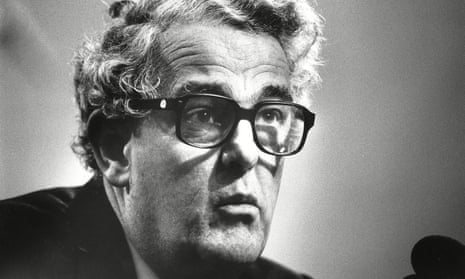Richard Norton-Taylor writes: I first got to know Tam Dalyell well during the 1982 Falklands war and his tenacious questioning of Margaret Thatcher’s government over the circumstances surrounding the sinking of the Argentinian cruiser, the General Belgrano. He was also the only MP who pursued successive governments over the forced exile of the inhabitants of Diego Garcia, the largest island in the British Indian Ocean Territory, by the Labour government in the 1960s. The US was allowed to build a large US bomber base there in return for a cut in the price of Polaris nuclear missiles, the predecessors of Trident.
“It’s Tam here,” he would say when phoning, in a hushed voice that always sounded more much conspiratorial than it ever really was. It was merely a reflection of his old-fashioned courtesy. That personal courtesy never stopped him pursuing the truth. He was twice suspended from the House of Commons for calling Thatcher a liar. The last time Tam phoned me was a little over a year ago. He had read the second volume of Charles Moore’s biography of Thatcher. Moore revealed that senior Whitehall officials were told that, as Tam had asserted in the Commons, Thatcher personally wanted a crucial letter to be leaked in the Westland helicopter affair that prompted the resignations of Michael Heseltine as defence secretary and Leon Brittan as trade secretary, in 1986.
Tam said he had written to the speaker, John Bercow, asking him if the Commons record could be amended to state that his suspension was unjustified. He was subsequently told it was not possible to amend “an accurate historical record in the light of later revelations”. That, he was told, was a matter for historians in the future.
Steven Rose writes: When Tam Dalyell was suspended from the Commons in 1968 over his “leak” of select committee papers to the Observer about Britain’s military research centre at Porton Down, Wiltshire, it followed his visit to the chemical and biological warfare laboratories there. At the time I was active in the opposition to CBW, and had been in discussion about the work at Porton with Tam, whom my wife, the sociologist Hilary Rose, and I had first got to know when we were working on science policy for the Labour party prior to Harold Wilson’s election victory in 1964. Porton banned me from visiting and Tam jumped at the chance of going with a parliamentary delegation, afterwards discussing with us what he had and hadn’t observed. His suspension may have blighted his ministerial chances, but it made him a hero of the left, and we became firm friends.
